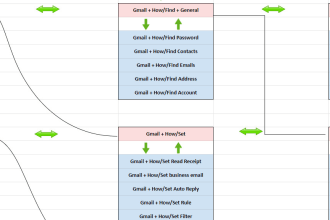Browse categories
Keyword Research
Maximize your SEO efforts with keyword research services
|7,600+ Results
Sort by:

Level 2
I will do profitable seo keyword research and competitor analysis
From $25
Offers video consultations

Level 2
I will conduct keyword research for your website to improve SEO
From $75
Offers video consultations
Keyword Research FAQs
What is Keyword Research, and why is it important for SEO?
Keyword research refers to the process of looking up and analyzing popular search terms that your target audience types into search engines like Google or Bing. It’s also a vital component of SEO. When you know what your audience is looking for, you’d better understand the demand for particular keywords. Furthermore, it helps you become better informed about your optimization strategy. Keyword research is essential for SEO because it helps you discover what your target audience is looking for. However, keyword research isn’t just about knowing what people are searching for; it also involves analyzing these keywords and finding ones that can help bring more traffic to your site. By using the right keywords, you’re helping search engines determine where your website will be displayed on its search engine results page (SERPs). Furthermore, keyword research gives you more insight into your audience’s needs and pain points. It also helps keep you up to date with emerging or current trends.
How does a professional Keyword Researcher find the best keywords for a client?
Professional keyword researchers can begin finding the best keywords by uncovering your audience’s keyword or search intent, which can fall under four types: informational, navigational, transactional, or commercial. Keyword researchers will then create a list of general topics that are still relevant to your niche. From there, they can expand on each topic and assign potential keywords, including long-tail keywords that are more specific, that your audience will likely be using. Aside from finding the best keywords, your professional researcher can also look for related search terms to expand their keyword list further. Then, they must identify which SEO keyword research tool or generator they’ll use. Using their chosen keyword research tool, your professional keyword researcher can look into the following factors to begin keyword analysis: - Search volume of a particular keyword or keyword phrase - Related terms - Competition for a specific keyword - Search intent verification
How does Keyword Research benefit a business's website and online presence?
Keyword research can help businesses create a better marketing and SEO strategy. Furthermore, it lets you find and target high ROI keywords, which can generate more quality leads and drive conversions and sales. It also gives you a deeper insight into your audiences and what they need, allowing you to tailor your content to suit their needs better. Below are other notable benefits that keyword research can bring to your business and online presence: - It bolsters your website optimization efforts - It can inform your content management strategy - You can use keyword research to optimize your other channels, such as online directories and social media pages - You can also use keyword research to track your progress Moreover, if you’re using keyword research to boost your ranking on SERPs, this can also positively affect your credibility. For instance, if your website ranks higher on SERPs, it will come across as reliable or high-quality to your audience, which can help boost your business’s credibility. Plus, by leveraging keyword research, you can optimize your website better, leading to improved user engagement and website usability.
Can you explain the difference between short-tail and long-tail keywords?
Short-tail keywords or head terms, which are made up of 1-3 words, are considered general search terms that typically have a higher search volume. While they may direct a lot of traffic, given their generic nature, short-tail keywords may not have the appropriate user intent for your business. Moreover, there’s a lot of competition for short-tail keywords, making it difficult for you to gain a higher ranking on SERPs. Meanwhile, long-tail keywords, which are longer and go beyond three words, are more specific search terms. While they have a lower search volume and are “less popular” than their shorter counterparts, long-tail keywords can better signal search intent and give way to more specific search results. An example of a short-tail keyword is “scrambled eggs”, while its long-tail keyword counterpart would probably be something like “how to make fluffy scrambled eggs”.
Can you explain the process of conducting a Keyword Gap Analysis?
Keyword gap analysis refers to an SEO strategy that identifies the keywords that bring traffic to your competitor’s site. By conducting a keyword gap analysis, you can spot keyword opportunities you may have missed and, thus, use this information to optimize your strategy by targeting keywords that rank higher or drive a lot of traffic. To conduct a keyword gap analysis, identify your competitors and find the right tools. Using your chosen keyword gap analysis tool, input your and your competitors’ respective website domains and start the analysis. Once done, review the results and look for keywords relevant to your business, have a high search intent, and have relatively low competition while still being valuable. By doing so, you can spot opportunities to improve your rankings, like refreshing existing content or creating new content. Through keyword gap analysis, you can also determine which types of content perform better and how long optimal content is.
Can you explain the impact of Keyword Research on the overall Digital Marketing strategy for a client?
Through keyword research, you can find the right keywords that will allow you to clearly explain what you can offer to your audience. It enables you to uncover and better address your audience’s pain points, and it can also help set you apart from the competition. Furthermore, keyword research acts as a foundation for your online marketing efforts. Without it, optimizing your website or creating content that drives traffic and conversions can be difficult. Moreover, through keyword research, you can create a strategy that optimizes your website and pull up its SERP ranking. Ranking higher on search results will make it easier for your target audience to find your business.




















